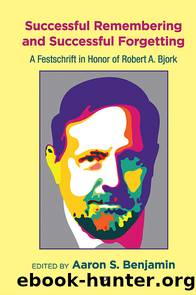Successful Remembering and Successful Forgetting by Benjamin Aaron S

Author:Benjamin, Aaron S.
Language: eng
Format: epub
Tags: Behavioral Sciences
Publisher: Taylor & Francis
Published: 2010-11-14T16:00:00+00:00
13
DESIRABLE DIFFICULTIES AND STUDYING IN THE REGION OF PROXIMAL LEARNING
Janet Metcalfe
INTRODUCTION
The desirable difficulties perspective (E. L. Bjork & Bjork, 2011; R. A. Bjork, 1988, 1992; Bjork & Bjork, 2006; R. A. Bjork & Linn, 2006) and the region of proximal learning framework (e.g., Kornell & Metcalfe, 2006; Metcalfe, 2002, 2009; Metcalfe & Kornell, 2005) appear, at least on the surface, to be at odds. The desirable difficulties perspective says that individuals should make things hard on themselves (but in a good way). Instructors should not spare the learners, but instead they should challenge them and make learning difficult. People should embrace difficulties, because it is through those difficulties that long-term learning occurs. The term desirable is added to difficulties, but even so the message is that learning should be a challenge. The region of proximal learning framework proposes that learning is optimized by having the learner study materials that are not very difficult, given the individual’s current state of learning. Indeed, they should be the easiest possible as-yet-unlearned items—just beyond what the learner has already fully mastered, but not much beyond. Too much difficulty, within this framework, is seen as maladaptive and potentially disheartening.
Both of these views are intuitive. The desirable difficulties perspective capitalizes on the adage “no pain, no gain” and on the pervasive work ethic emphasizing the moral value of hard work and diligence that many cultures claim for their own. The region of proximal learning framework resonates with the developmental philosophies of Piaget (1952) and Vygotsky (1987), including the idea that there is a zone of proximal development that is just beyond what the child is capable of easily on his or her own, in which he or she could learn via scaffolding. It also conforms to the transitional learning stage in Atkinson’s (1972) Markov model, in which items that are not yet permanently learned, but rather are in a state of being almost learned, are those on which the learner should concentrate. It takes seriously the so-called labor in vain effect of Nelson and Leonesio (1988) whereby people may spend a great deal of time selectively working on the most difficult items, but this extra time and effort is without payoff. It results in no memory benefit. In the world of education, the region of proximal learning framework resonates to the notion of “just right” books for children in which their own reading level is assessed and then they are given books very close to their own skill level. Allowing children to read at their own level is thought to promote fluency and faster, not slower, progress. It is also thought to make reading more enjoyable and less frustrating. The adage that comes to mind for the region of proximal learning framework is that it is sensible to first take the “low-hanging fruit.”
The apparent conflict between the desirable difficulties and the region of proximal learning views does not do justice to either framework, however. Both are more nuanced than such a simplistic overview would suggest. The
Download
This site does not store any files on its server. We only index and link to content provided by other sites. Please contact the content providers to delete copyright contents if any and email us, we'll remove relevant links or contents immediately.
The Art of Thinking Clearly by Rolf Dobelli(10487)
Mindhunter: Inside the FBI's Elite Serial Crime Unit by John E. Douglas & Mark Olshaker(9339)
Change Your Questions, Change Your Life by Marilee Adams(7780)
Nudge - Improving Decisions about Health, Wealth, and Happiness by Thaler Sunstein(7706)
Mastermind: How to Think Like Sherlock Holmes by Maria Konnikova(7342)
The Power of Now: A Guide to Spiritual Enlightenment by Eckhart Tolle(5781)
Men In Love by Nancy Friday(5240)
Altered Sensations by David Pantalony(5103)
Factfulness: Ten Reasons We're Wrong About the World – and Why Things Are Better Than You Think by Hans Rosling(4742)
The Confidence Code by Katty Kay(4260)
Thinking in Bets by Annie Duke(4226)
Man and His Symbols by Carl Gustav Jung(4135)
The Worm at the Core by Sheldon Solomon(3487)
Why Buddhism is True by Robert Wright(3452)
Liar's Poker by Michael Lewis(3447)
Three Women by Lisa Taddeo(3433)
The Inner Life of Animals by Peter Wohlleben(3318)
Descartes' Error by Antonio Damasio(3277)
How Music Works by David Byrne(3268)
